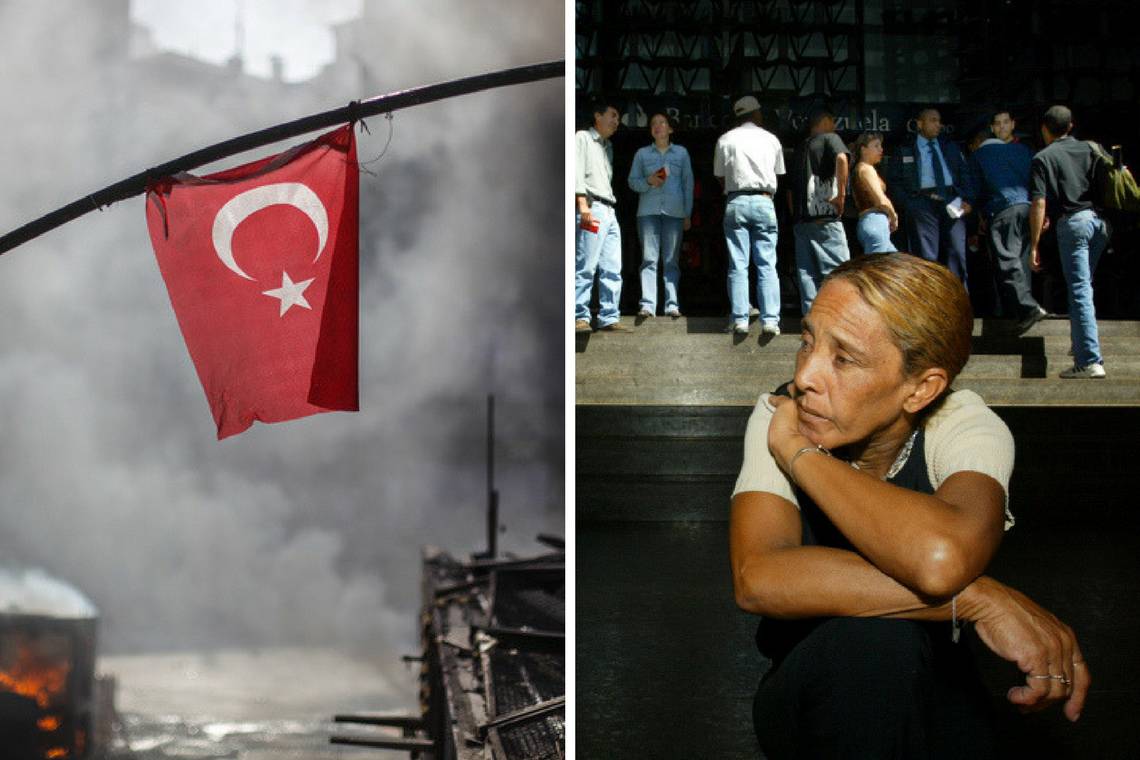Authoritarian Backlash: How Turkey and Venezuela Differ

Authoritarian leaders of Turkey and Venezuela use similar tactics to hold on to power: crackdown on opponents, severely limit freedom of the press and transform institutions to fit their ideology.
But their economies are like night and day.
With a diverse economic base and a rise in tourism dollars, Turkey’s gross national product has tripled over the past decade. Meanwhile, Venezuela’s inflation is at 700 percent and expected to climb to 1,600 percent next year, said Patrick Duddy, a former United States ambassador to Venezuela who now teaches at Duke.
“Once the world’s largest oil producer, Venezuela is on the verge of becoming a failed nation-state,” Duddy said.
The history and tactics that have landed each county on a drastically different path was the subject of a discussion Friday, “Authoritarian Backlash: Turkey and Venezuela in Comparison,” with Duddy and Robert Pearson, a retired professional Foreign Service officer who served as U.S. ambassador to Turkey from 2000 to 2003. The Forum for Scholars & Publics hosted the event, which was co-sponsored by Duke's Middle East Studies Center and Center for Latin American and Caribbean Studies.
Pearson said among so-called free states Turkey, despite its economic strength, has had the biggest decline in democracy over the past 10 years. Since the failed coup last year of President Tayyip Erdogan, the government has “purged” thousands of civilians, academics, military personnel, police and criminal prosecutors, he said.
There’s one partially free newspaper but the government has some degree of authority over all the other papers plus radio and TV, he said.
“If they (authoritarians) can weaken or destroy the rule of law then they are in compete charge,” Pearson said.
Still, he added, “democracy is not quite dead in Turkey,” although it is one based on Erdogan’s theology-influenced politics of the Muslim Brotherhood.
“Since he’s been the winner of every general election since 2002, he considers himself the representative of the majority will of the people.”
That’s why Erdogan believes it’s his right to decide what’s best for Turkey, rather than any institution, ministry or the country’s constitution, Pearson said.
Erdogan barely won his last election, and his government has been pumping money into the economy to bolster it before he’s up for reelection in 2019. A weakened economy would deal a serious blow to Erdogan’s political control and future, Pearson said.
On the other side of the world, the failed policies and politics of a social democracy pushed by the late President Hugo Chávez has driven Venezuela into widespread decline.
Oil production has dropped by one-third of what it was in 1998, Venezuela now has one of the highest homicide rates in the world, long lines for bread and other basics snake around grocery stores. And according to some NGOs, working- and middle-class Venezuelans have lost 19 pounds of bodyweight since Nicolás Maduro was elected in 2013, Duddy said.
Chavez came to power in 1999 promising his administration would eradicate poverty and overhaul the economic system, Duddy said.
“Very shortly it became clear to the region and to the United States that the direction in which he was moving was the one that had largely been … determined by Fidel Castro,” Duddy said.
Chavez died in 2013. Under his handpicked successor, Nicolás Maduro, corruption and economic decline have devastated the country.
Oil production – which represents about 96 percent of Venezuela’s foreign earnings and more than half of the government budget -- is down about a million barrels a day, Duddy said. U.S. reliance on Venezuelan oil has shrunk, in part because the United States produces more oil.
Venezuela is billions of dollars in debt to China, citizens can’t get food or medicine and rioting in the streets is common.
“This has become a calamitous situation,” Duddy said.
Maduro, similar to Erdogan in Turkey, has pursued authoritarian practices to retain power, including limiting press freedoms, jailing opponents and trying to suppress legislative powers.
“Over last few months what we’ve seen is that the Venezuelan public has been more and more unhappy with the government,” Duddy said.
The United States continues to maintain relations with Turkey and Venezuela, despite their oppressive regimes.
“We talk to the Turks all the time at every level and very intensely,” Pearson said, noting the goal is to find common ground.
Maintaining a relationship with the NATO ally is “critical to the outcome of the Middle East.”
The U.S. remains Venezuela’s largest trading partner. The two countries have been friends since Venezuela helped America during the US Revolutionary War, Duddy said.
But because of the Venezuelan government’s “irrefutable efforts to undermine democracy” and its “extraordinary levels of corruption,” he said, the U.S. has leveled sanctions against individuals, including Maduro, and has limited the government’s access to the U.S. financial system.
The goal, Duddy said, is to “put pressure on the government and not make life worse for Venezuelans.” An oil embargo, for example, would do that and give Maduro ammunition to blame the country’s misery on the United States, he said.